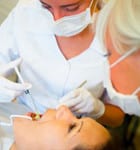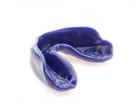 The temporomandibular joint or TMJ is probably one of the most important yet overworked joint in the body. It is the joint surrounded by tissue and muscle that joins the upper cranium to the lower jaw- you have two, one each side of your mouth. Every day in central Leeds, these joints are working every day, whether it’s by you chewing or talking or clenching, they are on the go all of the time. All dental work is linked to the protection of the TMJ because most treatments that you have, from the placement of a crown to orthodontic work, are designed to ensure the occlusion or ‘bite’ in the mouth remains true, so preventing extra stress being placed on the TMJ. However, one of the greatest enemies of the TMJ is teeth grinding; this can do untold damage to the joints and more throughout the head and neck. Some of the most obvious symptoms that imply the jaw is damaged in some way is problems with chewing, the locking of the jaw, ‘clicking’ whenever the jaw is in motion, facial, ear, head and neck pain and problems in the upper back. Depending how bad the problem is, the jaw will require surgery in order to solve the problem, but any signs of teeth grinding should also be addressed as soon as is possible to stop any further damage. Arthritis is also a problem for the TMJ and you will also be putting yourself at risk if you indulge in contact sports. You have to remember that these are two very tiny joints that you expect to do an awful lot of work, which is why they should be treated with respect.
The temporomandibular joint or TMJ is probably one of the most important yet overworked joint in the body. It is the joint surrounded by tissue and muscle that joins the upper cranium to the lower jaw- you have two, one each side of your mouth. Every day in central Leeds, these joints are working every day, whether it’s by you chewing or talking or clenching, they are on the go all of the time. All dental work is linked to the protection of the TMJ because most treatments that you have, from the placement of a crown to orthodontic work, are designed to ensure the occlusion or ‘bite’ in the mouth remains true, so preventing extra stress being placed on the TMJ. However, one of the greatest enemies of the TMJ is teeth grinding; this can do untold damage to the joints and more throughout the head and neck. Some of the most obvious symptoms that imply the jaw is damaged in some way is problems with chewing, the locking of the jaw, ‘clicking’ whenever the jaw is in motion, facial, ear, head and neck pain and problems in the upper back. Depending how bad the problem is, the jaw will require surgery in order to solve the problem, but any signs of teeth grinding should also be addressed as soon as is possible to stop any further damage. Arthritis is also a problem for the TMJ and you will also be putting yourself at risk if you indulge in contact sports. You have to remember that these are two very tiny joints that you expect to do an awful lot of work, which is why they should be treated with respect.









 Playing certain sports can put you at risk of injuries to some parts of your body. You should be careful to protect your body so that it doesn’t get injured and you have to go to hospital or end up with a life long complaint. This is as true of your mouth as it is the rest of your body because some sports and past times can pose a risk to your teeth either in the form of impact with other players or the ball, or the risk of falling, face-first, to the ground.
Playing certain sports can put you at risk of injuries to some parts of your body. You should be careful to protect your body so that it doesn’t get injured and you have to go to hospital or end up with a life long complaint. This is as true of your mouth as it is the rest of your body because some sports and past times can pose a risk to your teeth either in the form of impact with other players or the ball, or the risk of falling, face-first, to the ground. It’s not really rocket science- the clue is in print, in the title- mouth-guard. It’s a device that does what it claims, protecting your mouth from any possible chance of injury…where it can and within reason. In the city of Leeds, mouth guards are used in all walks of life; from hospital surgery, through to dentists and sports, you’ll find them everywhere. If you play a lot of contact sports, the best way of protecting your mouth and its teeth, your jaw and your neck, they will help, at the very least, help limit the injuries that you sustain. The guard of your choice is essentially down to you, but with a little research, you can choose the right one that is tailored to the games that you play. Dentists incorporate them in many procedures. Modern styles of orthodontic procedures to correct teeth alignment veer away from traditional braces, preferring devices that are more akin to a boxer’s gum-shield. Bruxism or teeth grinding is very damaging to the mouth; gum-shields are often used to protect the teeth from unnecessary wear and tear during the treatment of the problem (they are also used in the treatment of snoring). One of the more fashionable ways a mouth-guard is used is in the field of cosmetic dentistry- teeth bleaching. The shield not only houses the bleaching agent to whiten your teeth, but it also protects the rest of the mouth being damaged by the chemicals in the bleach.
It’s not really rocket science- the clue is in print, in the title- mouth-guard. It’s a device that does what it claims, protecting your mouth from any possible chance of injury…where it can and within reason. In the city of Leeds, mouth guards are used in all walks of life; from hospital surgery, through to dentists and sports, you’ll find them everywhere. If you play a lot of contact sports, the best way of protecting your mouth and its teeth, your jaw and your neck, they will help, at the very least, help limit the injuries that you sustain. The guard of your choice is essentially down to you, but with a little research, you can choose the right one that is tailored to the games that you play. Dentists incorporate them in many procedures. Modern styles of orthodontic procedures to correct teeth alignment veer away from traditional braces, preferring devices that are more akin to a boxer’s gum-shield. Bruxism or teeth grinding is very damaging to the mouth; gum-shields are often used to protect the teeth from unnecessary wear and tear during the treatment of the problem (they are also used in the treatment of snoring). One of the more fashionable ways a mouth-guard is used is in the field of cosmetic dentistry- teeth bleaching. The shield not only houses the bleaching agent to whiten your teeth, but it also protects the rest of the mouth being damaged by the chemicals in the bleach. Mouth guards are used all around central Leeds. They are more normally associated with sports, especially contact sports like boxing or rugby, but they are also used in some dental procedures. If you work hard, it’s relaxing to play hard and a lot more of us are turning to sport to blow off steam. However, quite a percentage of sports will require you to wear a mouth guard. Now you’d think that it’s only to stop your teeth getting knocked out (well yes), but a good mouth guard can prevent very serious injuries from occurring. They can protect lips and gums, and prevent neck and jaw injuries that can be costly to repair. There are three types of sporting mouth guards on the market: one you buy off the shelf, another that you mould into your mouth or one that you can have custom made for you. When it comes to dentistry, they too have uses here. In our endless search for nice teeth, home bleaching kits are becoming very popular, incorporating a tight fitting gum shield to put the bleaching agent in. Orthodontic aligners such as Invisalign are clear, thin, guard shaped aligners that help straighten the teeth. Mouth guards also help in the treatment of bruxism or teeth grinding.
Mouth guards are used all around central Leeds. They are more normally associated with sports, especially contact sports like boxing or rugby, but they are also used in some dental procedures. If you work hard, it’s relaxing to play hard and a lot more of us are turning to sport to blow off steam. However, quite a percentage of sports will require you to wear a mouth guard. Now you’d think that it’s only to stop your teeth getting knocked out (well yes), but a good mouth guard can prevent very serious injuries from occurring. They can protect lips and gums, and prevent neck and jaw injuries that can be costly to repair. There are three types of sporting mouth guards on the market: one you buy off the shelf, another that you mould into your mouth or one that you can have custom made for you. When it comes to dentistry, they too have uses here. In our endless search for nice teeth, home bleaching kits are becoming very popular, incorporating a tight fitting gum shield to put the bleaching agent in. Orthodontic aligners such as Invisalign are clear, thin, guard shaped aligners that help straighten the teeth. Mouth guards also help in the treatment of bruxism or teeth grinding. Many of us may find ourselves in situations where our teeth need protecting. Whether we play a highly physical sport such as lacrosse, rugby, American football or boxing or indulge in activities such as mountain biking or gymnastics which can cause injuries to the mouth, our teeth can be put at risk. Some of us even have the tendency to grind our teeth during sleep. Protecting our teeth in these situations is vital to ensure that we don’t suffer the pain and inconvenience of tooth loss or chipping.
Many of us may find ourselves in situations where our teeth need protecting. Whether we play a highly physical sport such as lacrosse, rugby, American football or boxing or indulge in activities such as mountain biking or gymnastics which can cause injuries to the mouth, our teeth can be put at risk. Some of us even have the tendency to grind our teeth during sleep. Protecting our teeth in these situations is vital to ensure that we don’t suffer the pain and inconvenience of tooth loss or chipping.

